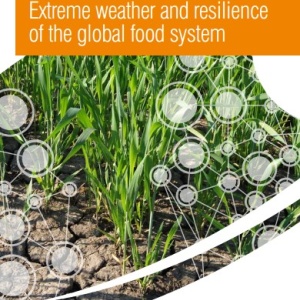
This report is the result of the work of a Taskforce of academics, industry and policy experts commissioned to examine the resilience of the global food system to extreme weather. The summary report is built on three detailed reports: Climate and global production shocks (Annex A); Review of the responses to production shocks (Annex B) and the Country-level impacts of global grain production shocks (Annex C).
The report concludes that the global food system is vulnerable to production shocks caused by extreme weather, and that this risk is growing. It suggests that climate change and a growing population will increase the likelihood of food "shocks" - where the production of staple crops such as rice, wheat and soybean fall by 5-7%, arguing that it will triple in likelihood in just 25 years. The preliminary analysis of limited existing data suggests that the risk of a 1-in-100 year production shock is likely to increase to 1-in-30 or more by 2040.
The implications of such shocks would be extremely serious and such a shortfall in production could leave people in developing countries in “an almost untenable position”, with the US and the UK “very much exposed” to the resulting instability and conflict. The researchers urge the need for action to improve the global food system’s to weather-related shocks.
The report is also covered by The Guardian, New Scientist and by The Times - the Times says that the risks of global food shortages pose a risk for Britain by increasing the threat from terrorism.
The key recommendations of the report include:
- Understand the risks better
More research is needed to understand and quantify the risks set out in this report. Our assessment is that they are non-trivial and increasing, but our knowledge of how extreme weather may be connected across the world, and hence the precise probability of multiple bread basket failures, is limited by available model simulations. Modelling limitations also constrain our ability to understand how production shocks translate into short run price impacts.
- Explore opportunities for coordinated risk management
As knowledge emerges regarding plausible worst case scenarios, it will be possible for governments, international institutions and businesses to develop contingency plans and establish early warning systems with agreed response protocols. Other opportunities include coordinated management of emergency and/or strategic reserves.
Improve the functioning of international markets
History demonstrates that the actions of market participants in response to production losses, or the behaviours of other actors, are a crucial determinant of price impacts. Other problems that can exacerbate price spikes include low levels of stocks relative to consumption, poor transparency of market information and physical limitations on trade such as infrastructural constraints.
- Bolster national resilience to market shocks
Governments should also consider policies to bolster national resilience to international market shocks. This is a particularly important policy agenda for import dependent developing countries with high numbers of poor food consumers, and/or high risk of political instability. The precise mix of appropriate policy measures will vary according to national context.
- Adapt agriculture for a changing climate
Agriculture faces a triple challenge. Productivity must be increased by reversing declines in yield growth and closing the gap between actual and attainable yields in the developing world, whilst also reducing its environmental impact (eg 50:1 degradation, depletion of freshwater supplies, increasing greenhouse gas emissions or eutrophication). However, given the increasing risk of extreme weather, this cannot come at the expense of production resilience. Increases in productivity, sustainability and resilience to climate change are required. This will require significant investment from the public and private sectors, as well as new cross-sector collaborations.
Citation
Extreme weather and resilience of the global food system (2015). Final Project Report from the UK-US Taskforce on Extreme Weather and Global Food System Resilience, The Global Food Security programme, UK.
Read the full report here. You can also see more on Climate change: impacts and adaptation in our research library.







Post a new comment »